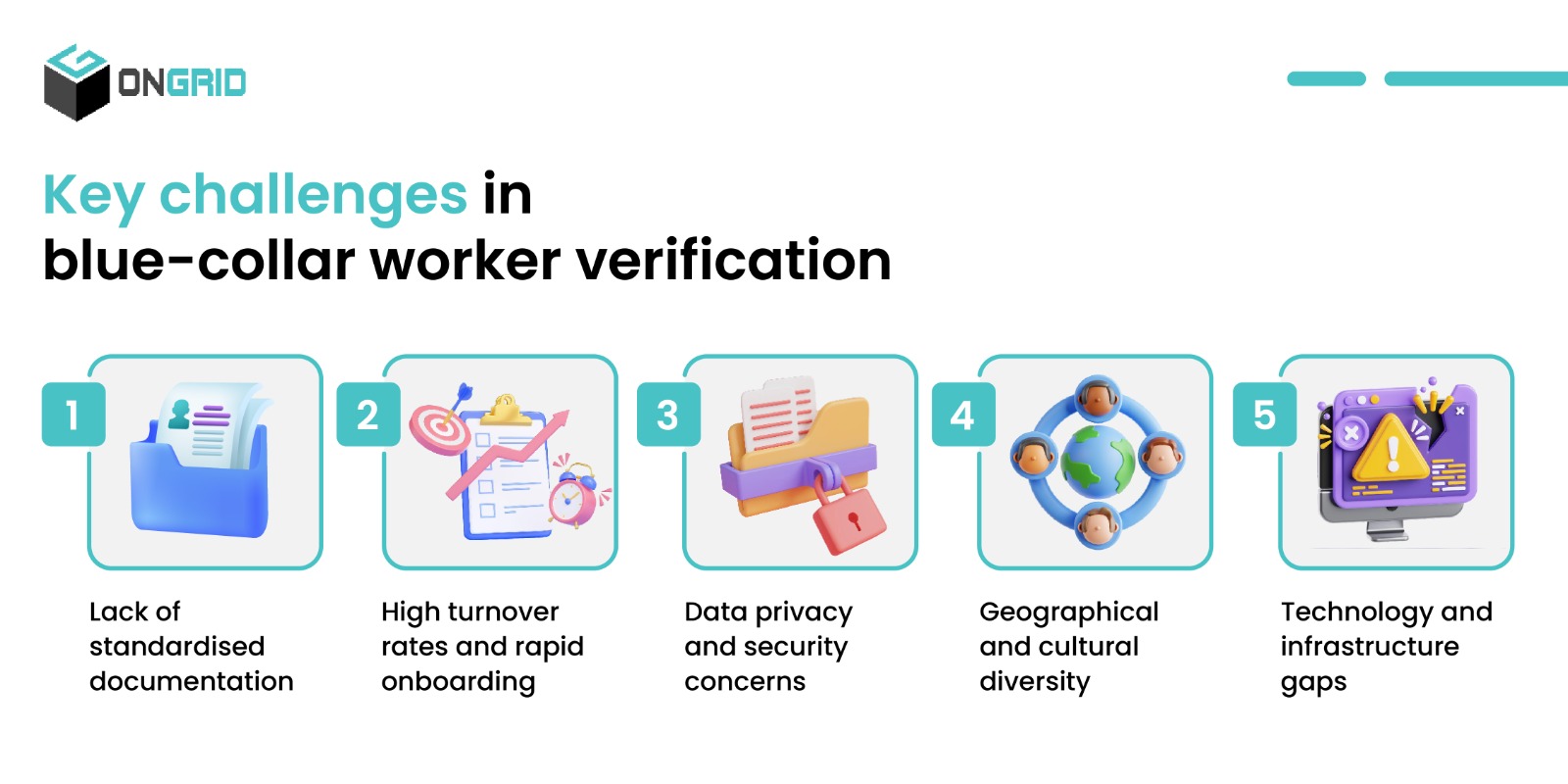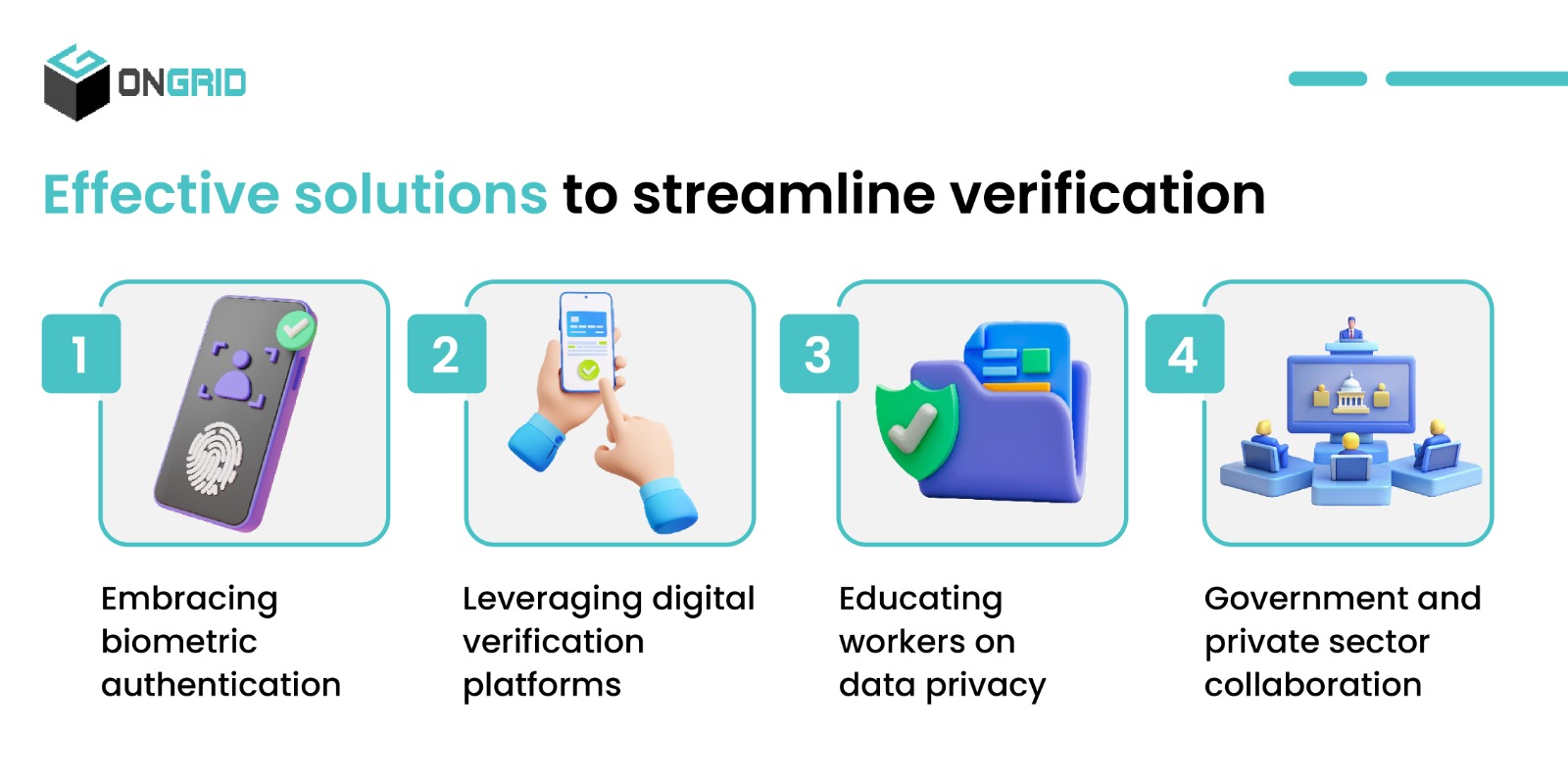Table of Contents
ToggleIndia’s blue-collar workforce is the backbone of its booming gig economy. With expanding industries like e-commerce, manufacturing, logistics, and construction, this workforce has grown significantly, supporting urban centres and regional communities. But with rapid expansion comes a unique set of challenges, one of the most pressing being the effective identity verification for blue collar workers. Ensuring safe and reliable verification processes is essential, especially for an industry that supports millions of families while catering to critical sectors.
The Blue-Collar Workforce Boom
India’s blue-collar workforce is estimated to be over 200 million strong. As companies, especially in urban areas, rely increasingly on workers for operational support, the demand for skilled and semi-skilled labourers has surged. This shift is further accelerated by the gig economy, which opens doors for on-demand employment opportunities. Workers are now needed at short notice, making the workforce increasingly transient and hard to track.
However, the rapid expansion and diverse nature of this workforce present challenges, particularly in accurately verifying their identities. Unlike white-collar employees, who generally have more standardised identification documents, many blue-collar workers come from diverse backgrounds and regions, often lacking uniform or verifiable records. This gap creates serious verification challenges, putting businesses, workers, and the broader public at risk.
Key Challenges in Blue-Collar Worker Verification

1. Lack of standardised documentation
A significant challenge in verifying blue-collar workers is the lack of standardised and complete documentation. Many of these workers come from rural or underserved communities where access to formal education, secure housing, and government-issued documents may be limited. Documents such as Aadhaar, PAN cards, or voter IDs may not always be available, and even when they are, they may lack the consistency needed for formal employment processes.
2. High turnover rates and rapid onboarding
High employee turnover is a hallmark of the blue-collar sector, especially in industries like logistics, construction, and retail. To meet demand, companies often need to onboard workers quickly. However, rushed hiring processes can lead to bypassing proper identity verification, creating potential security risks. Short-term employment, seasonal hiring, and the need for immediate onboarding further exacerbate these issues, forcing companies to balance speed with security.
3. Data privacy and security concerns
As companies gather large volumes of personal data, concerns around data security and privacy naturally arise. Blue-collar workers may not be aware of their rights regarding data privacy, making it even more critical for companies to handle their information responsibly. Mishandling or compromising worker data not only harms individuals but also damages the company’s reputation, making it harder to attract reliable talent in the future.
4. Geographical and cultural diversity
India’s diverse cultural and geographical landscape introduces verification complexities. Workers from different regions often carry local identification documents or face language barriers, complicating the verification process. While some verification systems rely heavily on digital literacy, many workers are only just adapting to digital practices, further complicating identity verification procedures.
5. Technology and infrastructure gaps
Verification relies increasingly on digital solutions, but digital literacy and infrastructure gaps in certain areas hinder this process. Rural regions, where many workers are sourced, often lack consistent internet access or digital infrastructure, complicating remote verification. While initiatives like mobile-based verification are emerging, they require robust backend systems and worker awareness to be truly effective.
Effective Solutions to Streamline Verification

Given these challenges, companies are finding ways to ensure that the verification process is secure, efficient, and inclusive. Solutions such as mobile-based verification, biometric authentication, and background verification platforms are proving useful in navigating these issues.
1. Embracing biometric authentication
Biometric authentication, such as fingerprint and facial recognition, can be a game-changer for identity verification for blue collar workers. It is especially beneficial for workers who may lack traditional documents, providing a reliable, accessible, and tamper-proof verification method. Biometric systems can also streamline re-verification for repeat hires, especially in industries with high turnover.
2. Leveraging digital verification platforms
Digital platforms, like OnGrid and other verification solutions, offer end-to-end digital verification processes. These platforms can conduct background checks quickly, verify documents online, and ensure that a worker’s credentials are legitimate, significantly reducing onboarding time. A centralised verification platform also enables companies to maintain comprehensive worker records, aiding re-verification and compliance.
Read Also: Blue Collar Verification
3. Educating workers on data privacy
Empowering workers with knowledge about data privacy rights and consent is critical. Companies can host awareness sessions or provide digital resources to explain what data is collected, how it will be used, and the security measures in place. Transparent data practices not only build trust but also create an environment of mutual respect, encouraging workers to complete verification with confidence.
4. Government and private sector collaboration
Collaboration between government and private sectors can create a more cohesive identity verification ecosystem. Initiatives like Aadhaar, which provide a unique identification number to residents, can be leveraged further in blue-collar industries with government-backed support for accessible verification systems. Streamlined, accessible government databases can significantly ease verification challenges.
Moving Toward a Secure and Inclusive Verification Future
The need for reliable identity verification for blue collar workers will only grow as demand for these workers increases. Effective verification builds trust and enhances workplace safety, ensuring that companies can confidently onboard workers who align with their safety and security requirements. However, to achieve this, companies must adopt a holistic verification approach that respects the worker’s background, embraces technology, and fosters transparency.
By combining digital platforms with education, transparency, and government support, the verification process can be made more inclusive and robust. Embracing these practices will not only strengthen worker-company relationships but will also contribute to the safety and growth of India’s dynamic blue-collar workforce, setting a standard for responsible employment practices.





Leave a Reply